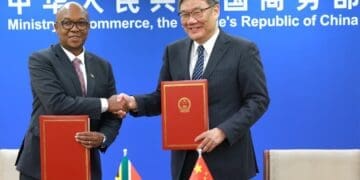By: Anna Majavu
Deputy President Paul Mashatile has asked the government and South African businesses to publish their localisation targets so that they can report on how many goods and services they procure from local companies. Speaking at the Buy Local Summit in Sandton this week, Mashatile promised that the government would lead the localisation efforts by example.
He said the Covid-19 pandemic shift away from imported medical grade sanitisers, respiratory masks, face shields, and medical gloves to local production of these goods had shown that the government and businesses were capable of setting up localised supply chains.
Businesses who had invested in equipment enabling them to produce previously imported goods locally during the pandemic should not now lose out on orders “because of the state’s new preference for imported products, even in situations where these products can be sourced locally”, Mashatile said. “We are thus making a concerted effort to ensure that we remind all procurement authorities and decision-makers in the public sector of this dynamic. As part of this effort, we ask them to maintain local content standards in their preferential procurement policies.”
The current crisis of load-shedding presented an opportunity for businesses to start local manufacturing of the components for wind turbines, solar panels, and other forms of energy storage. “By producing it domestically, we may avoid paying import taxes on similar machinery, and the current energy crisis presents an opportunity to expand employment opportunities in a field with significant demand,” he said.
Several companies had set reviewable localisation targets for themselves, first increasing their local procurement spend and reducing the number of products they imported. They had then invested in development programmes for suppliers, and this often included a condition that those suppliers also procure goods locally. Building additional local factories or investing in equipment to produce more locally, and manufacturing new products also boosted the capacity of these businesses to localise.
Increasing the amount of locally produced raw materials and components, and giving more shelf space to other local manufacturers were important parts of localisation plans, Mashatile said.
The employment rate would increase by eight percent if investments in the labour-intensive industry went up by just 10%, and this would lead to a nine percent jump in tax revenues, he added. If businesses committed to local procurement, this could also save industries that have been decimated by illegal imports and floods of cheap, legal imports.
































































